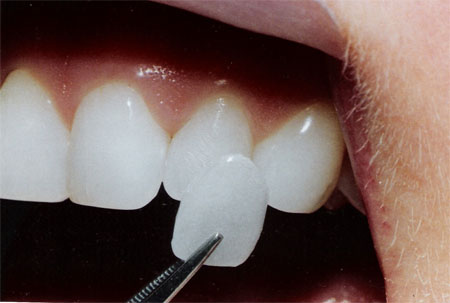E-DENTAL
Family & Cosmetic Dentistry


Dental Veneers Explained: What They Are, How They Work, and If They’re Right for You
A confident smile can make a difference in personal and professional settings. If you’ve ever felt self-conscious about discolored, chipped, or misaligned teeth, you may have considered cosmetic dental treatments. Among the most popular solutions are dental veneers—a transformative option for achieving a flawless smile. But what are dental veneers, and how do they work? Let’s explore everything you need to know, from the dental veneers process to their benefits, costs, and longevity.
What Are Dental Veneers?
Before diving into the details, let’s start with the basics: what are dental veneers? They are thin, custom-made shells designed to cover the front surface of teeth to improve their appearance. These shells are typically crafted from porcelain dental veneers or composite resin materials and mimic the natural translucency of real teeth.
Veneers can address a variety of dental concerns, including:
- Discoloration or severe staining that doesn’t respond to whitening treatments
- Chipped, broken, or worn-down teeth
- Uneven spacing or gaps between teeth
- Mild misalignment or irregularly shaped teeth
Since veneers are purely cosmetic, they don’t address functional issues like missing teeth or severe bite problems. This raises a common question: are veneers dental implants? The answer is no. Unlike dental implants, which replace missing teeth entirely, veneers simply enhance the appearance of existing teeth by covering their imperfections.
How Do Dental Veneers Work?
Now that we’ve answered what dental veneers are let’s discuss their functionality. The dental veneer process involves several key steps:
1. Consultation and Planning
The journey to a new smile begins with a consultation with a dentist or cosmetic specialist. During this visit, the dentist assesses your teeth, discusses your cosmetic goals, and determines whether veneers are the right option.
2. Preparation of the Teeth
To ensure a natural fit, a small amount of enamel (usually about 0.5mm) is removed from the front of the teeth. This creates space for the veneers to sit flush with the surrounding teeth. A mold or digital impression is then taken and sent to a dental lab, where the porcelain dental veneers or composite veneers are custom-made.
3. Temporary Veneers (If Needed)
Some patients opt for temporary veneers while waiting for their permanent ones to be fabricated. This allows them to test the feel and look of veneers before the final placement.
4. Bonding the Veneers
Once the veneers are ready, the dentist places them on the teeth to check the fit and appearance. After any necessary adjustments, the veneers are permanently bonded using a special adhesive and cured with a light to harden the bond.
This minimally invasive procedure typically requires little to no anesthesia, making it a comfortable experience for most patients.
What Are Dental Veneers Made Out Of?
One of the most common questions patients ask is: what are dental veneers made of? There are several types of veneers. The two primary materials used are:
Porcelain Dental Veneers
Known for their exceptional longevity, porcelain dental veneers closely resemble the translucency of natural teeth, making them a highly aesthetic option. Additionally, they resist stains from common culprits like coffee, wine, and smoking, ensuring a bright and beautiful smile for years.
Composite Resin Veneers
Composite resin veneers are a more affordable alternative to porcelain dental veneers. One of their key advantages is that they require less enamel removal. However, while they may not be as durable as porcelain, composite veneers still provide a significant cosmetic improvement.
Both options offer aesthetic enhancements, but porcelain dental veneers are generally preferred for their longevity and realistic appearance. In fact, at E Dental we don’t typically recommend composite resin veneers.
How Long Do Dental Veneers Last?
The lifespan of veneers depends on factors like material choice, oral hygiene, and lifestyle habits. On average:
- Porcelain dental veneers: 10–15 years, sometimes longer, with excellent care
- Composite veneers: 5–7 years before requiring replacement
To extend the life of veneers, patients should:
- Brush and floss regularly
- Avoid biting into hard objects like ice or pens
- Limit staining foods and drinks
- Wear a nightguard if they grind their teeth
With the right maintenance, veneers can provide long-lasting, beautiful results.
How Much Do Dental Veneers Cost?
The price varies based on location, the dentist’s expertise, and the veneer type. On average:
- Porcelain dental veneers: $900–$2,500 per tooth
- Composite veneers: $300–$1,500 per tooth
Several factors influence the final cost of dental veneers. The total number of veneers needed plays a significant role, as more veneers naturally increase the overall expense. The complexity of the case also affects pricing. More intricate dental issues may require additional customization or advanced techniques. Additionally, if supplementary procedures such as teeth whitening or gum contouring are needed to achieve the desired aesthetic, they can add to the overall cost of the treatment.
Insurance typically does not cover veneers since they are considered a cosmetic procedure, but many reputable dental offices offer payment plans to make them more affordable.
Benefits of Dental Veneers
The benefits of dental veneers go beyond just aesthetics. They offer:
- Instant Smile Transformation: Veneers provide an immediate improvement in the appearance of your teeth.
- Stain Resistance: Porcelain dental veneers resist stains, keeping your smile bright for years.
- Minimally Invasive Treatment – Unlike crowns, which require significant tooth reshaping, veneers require minimal enamel removal.
- Durability: With proper care, veneers can last a decade or longer.
- Boosted Confidence: A beautiful smile can enhance self-esteem and positively impact social and professional interactions.
Are Dental Veneers Right for You?
Veneers are a fantastic option for many but aren’t suitable for everyone. Ideal candidates include those who:
- Have good overall oral health
- Want to correct cosmetic concerns like discoloration, chips, or gaps
- Have sufficient enamel to support veneer placement
- Do not suffer from severe teeth grinding (bruxism) unless they wear a protective nightguard
If you have extensive tooth decay, gum disease, or severe misalignment, alternative treatments like crowns, orthodontics, or dental implants may better suit your needs.
Final Thoughts: Let Your Smile Shine with E Dental!
Understanding what dental veneers are and their potential benefits can help you make an informed decision about your smile. When considering how much dental veneers cost, weigh the investment against the long-term benefits. And if you’re wondering how long dental veneers last, rest assured that they can provide many years of beauty and function with proper care.
If you’re in Florida, checking out veneers Seminole specialists could be a great first step toward achieving your dream smile.
At E Dental, we provide expert family and cosmetic dentistry in Seminole and Apollo Beach, Florida. Whether you’re considering porcelain dental veneers, teeth whitening, or a complete smile makeover, our experienced team is here to help. Schedule your consultation today and take the first step toward a confident, radiant smile!
Complete the form below and one of our staff will contact you to confirm




